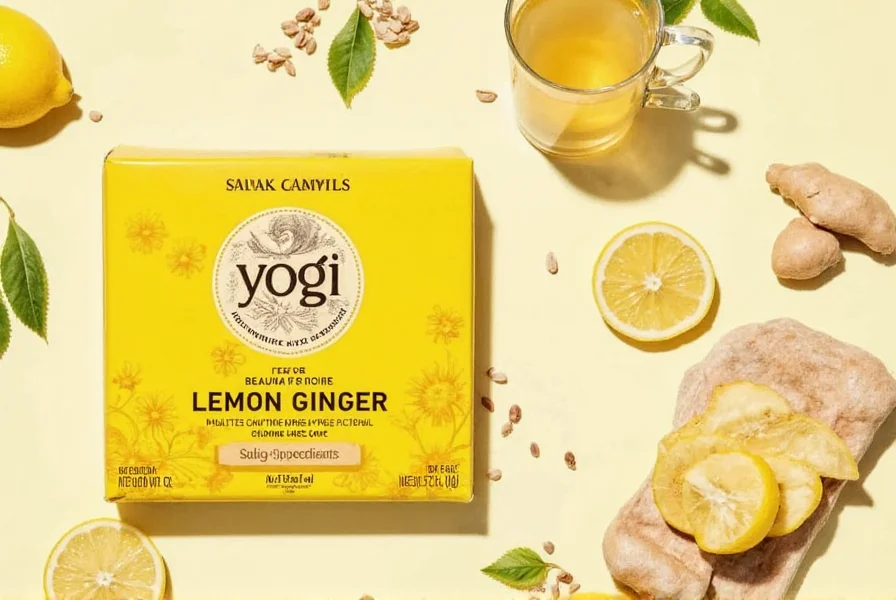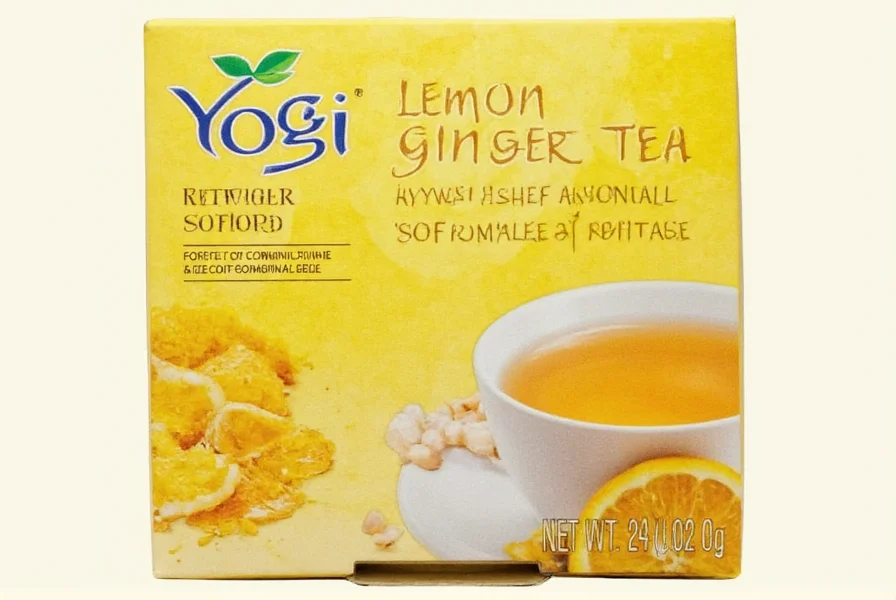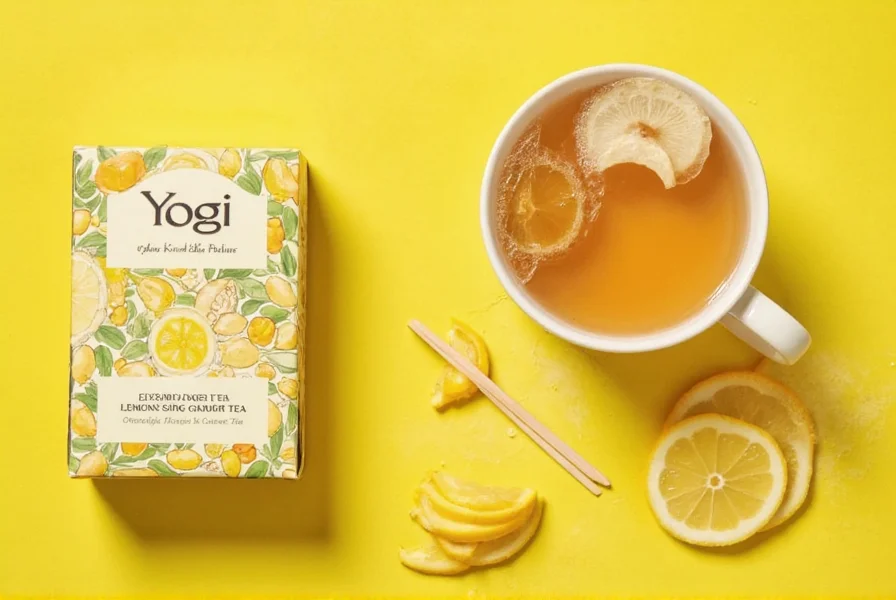Yogi Lemon Ginger Tea has gained popularity as a natural wellness beverage combining the spicy warmth of ginger with bright citrus notes. This caffeine-free herbal tea provides a soothing option for those seeking to support their daily wellness routine through botanical ingredients. Understanding the science behind this tea's formulation helps consumers make informed choices about incorporating it into their lifestyle.
Composition and Key Ingredients
Yogi Lemon Ginger Tea contains a specific blend of organic botanicals that work synergistically. Unlike many commercial teas that use artificial flavors, this blend relies on whole plant ingredients to create its distinctive profile. The primary components include:
| Ingredient | Percentage | Traditional Use |
|---|---|---|
| Organic Ginger Root | 45% | Digestive support, anti-inflammatory properties |
| Organic Lemon Myrtle | 20% | Antioxidant properties, natural citrus flavor |
| Organic Lemongrass | 15% | Digestive aid, calming effects |
| Organic Licorice Root | 10% | Throat soother, natural sweetness |
| Other Botanicals | 10% | Additional wellness properties |
Notably, Yogi Lemon Ginger Tea does not contain actual lemon, but rather lemon myrtle (Backhousia citriodora), an Australian botanical that provides natural lemon flavor without citrus fruit. This distinction is important for those with citrus allergies or sensitivities. Understanding yogi lemon ginger tea ingredients helps consumers make informed choices about what they're consuming.

Evidence-Based Benefits of Yogi Lemon Ginger Tea
When examining potential yogi lemon ginger tea benefits, it's essential to distinguish between traditional uses and scientifically supported effects. Ginger, the primary ingredient, has been studied extensively for digestive health.
A 2020 review in Nutrients found that "ginger has demonstrated significant effects on gastrointestinal motility and may accelerate gastric emptying." This research helps explain why many people report that yogi lemon ginger tea helps with digestion after meals. However, the review noted that most studies used concentrated ginger extracts rather than tea preparations.
Lemon myrtle contains high levels of citral, which has shown antioxidant properties in laboratory studies. A 2019 study in Food Chemistry found lemon myrtle had "significantly higher antioxidant capacity compared to other citrus plants." While promising, these findings represent laboratory research rather than clinical evidence specific to the tea blend.
Optimal Preparation Methods
Understanding how to brew yogi lemon ginger tea properly maximizes the extraction of beneficial compounds. The recommended preparation significantly affects the tea's potential benefits:
- Use freshly boiled water (208°F/98°C) for optimal extraction
- Steep for 7-10 minutes (longer steeping releases more ginger compounds)
- Cover while steeping to prevent volatile compounds from evaporating
- Squeeze the tea bag gently after steeping to release additional compounds
Many consumers wonder when to drink yogi lemon ginger tea for best results. While personal preference matters, optimal timing includes:
- 30 minutes before meals to potentially support digestion
- After meals to ease discomfort
- In the evening as a caffeine-free alternative to coffee or black tea

Safety Profile and Considerations
While generally considered safe, understanding yogi lemon ginger tea side effects is crucial for informed consumption. Ginger is well-tolerated by most people, but some may experience:
- Mild heartburn or stomach upset at high consumption levels
- Potential interactions with blood-thinning medications
- Increased risk of bleeding for those on anticoagulant therapy
Pregnant women should consult healthcare providers before consuming large amounts of ginger. The American College of Obstetricians and Gynecologists considers ginger safe in food amounts, but therapeutic doses may require medical guidance. Those with gastroesophageal reflux disease (GERD) may want to monitor their response, as ginger can sometimes exacerbate symptoms.
Comparing Yogi Lemon Ginger Tea to Alternatives
When consumers search for yogi lemon ginger tea vs regular ginger tea, they're often evaluating differences in formulation and potential effects. Key distinctions include:
- Ingredient complexity: Yogi's blend contains multiple botanicals working together, while basic ginger teas contain only ginger
- Lemon component: Lemon myrtle provides different phytochemicals compared to plain ginger tea
- Traditional formulation: Based on Ayurvedic principles of combining ingredients for specific wellness effects
Research comparing specific commercial tea blends is limited, but studies on individual ingredients suggest that combination formulas may offer broader potential benefits than single-ingredient teas. Many people specifically search does yogi lemon ginger tea help with colds, though scientific evidence for this specific application remains limited.
Evaluating Scientific Evidence
When assessing claims about is yogi lemon ginger tea good for colds, it's important to examine the research on its primary ingredients. A systematic review in Phytotherapy Research (2021) found that "ginger demonstrated significant anti-inflammatory and antioxidant activities that may support immune function." However, the review noted that most studies used concentrated ginger extracts rather than tea preparations.
It's crucial to understand that while individual ingredients show promise in research, the specific formulation of Yogi Lemon Ginger Tea hasn't been subjected to clinical trials. The tea should be viewed as part of an overall wellness routine rather than a treatment for specific medical conditions. This distinction is vital for maintaining accurate expectations about yogi lemon ginger tea benefits.
Frequently Asked Questions
What are the main ingredients in Yogi Lemon Ginger Tea?
Yogi Lemon Ginger Tea primarily contains organic ginger root (45%), organic lemon myrtle (20%), organic lemongrass (15%), organic licorice root (10%), and other botanicals (10%). The ginger provides the spicy base note, while lemon myrtle delivers the citrus flavor without actual lemon.
Does Yogi Lemon Ginger Tea contain actual lemon?
No, Yogi Lemon Ginger Tea does not contain actual lemon. Instead, it uses lemon myrtle (Backhousia citriodora), an Australian botanical that provides natural lemon flavor and aroma. This is why the ingredient list mentions "lemon myrtle" rather than lemon.
Can Yogi Lemon Ginger Tea help with nausea?
Ginger, the primary ingredient, has been studied for potential effects on nausea. Research suggests ginger may help with certain types of nausea, particularly pregnancy-related nausea. However, individual responses vary, and the tea should not be considered a treatment for severe nausea without consulting a healthcare provider.
Is Yogi Lemon Ginger Tea safe to drink daily?
For most adults, Yogi Lemon Ginger Tea is considered safe for daily consumption in moderate amounts (1-3 cups per day). However, those with certain medical conditions or taking specific medications should consult their healthcare provider before regular consumption.
How does Yogi Lemon Ginger Tea support digestion?
The ginger in this tea may support digestion by potentially accelerating gastric emptying and improving gastrointestinal motility, according to some research. Many people find drinking this tea before or after meals helps reduce feelings of bloating and discomfort.











 浙公网安备
33010002000092号
浙公网安备
33010002000092号 浙B2-20120091-4
浙B2-20120091-4